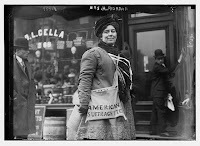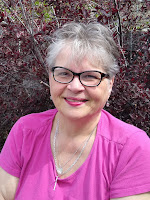Talkshow Thursday: Welcome Back, Donna Schlachter!
I'm thrilled to welcome friend and fellow author back to my blog. Listen in as she talks about her latest release, Rollie's Riddle, (Suffrage Spinsters).
What was your inspiration for the story?
I like strong, independent women, and when I heard about a series where the heroine was involved in the suffrage movement in America, that drew my interest. We take it so much for granted now, the ability to vote, that maybe sometimes we don’t even bother. But once I started doing research, and saw what these women went through to give fifty percent of our population to have a voice in our community and national affairs—well, I knew I had to join the stories.
How do you develop your characters? (e.g. decide on their vocation, names, etc.)?
In this story, I came up with her name first. Rolinda is formal, authoritative, rather masculine sounding. Rollie, her nickname, is softer, kinder, quiet. Both are her. Okay, maybe not the quiet part.
For my hero, I needed somebody who would be her equal. Lucas was more complicated than Luke. I liked that, because he is complicated.
What sort of research did you do for your story, and was there an exceptionally interesting tidbit you knew you had to include?
I used the internet, of course, and checked out an article I saw in Smithsonian magazine that talked
about the suffrage movement in New York in 1911 or thereabouts. Really, these women were brave. After being arrested during a parade to promote their cause, they went on a hunger strike. The jail brought in medical staff to tie them to chairs, force rubber tubing down their throats and into their stomachs, then they poured a warm milk drink into a funnel to the tubing. Needless to say, most of it came right back up. Torture, I believe. This prompted me to include a couple of lesser scenes in my story, although I did have a parade, arrests, and jail time.
If you were to write a spin-off book about one of your secondary characters, which one would you choose and why?
I’d like to write a spin-off book about the two black characters in my story, named Nina and Toby. Nina ventures out into a side hustle, and Toby is a black Pinkerton detective. You can imagine the trouble they could get into together.
How do you come up with storylines?
I am currently writing in a number of multi-author projects (MAPs) so the story premise is usually provided. For example, for this book, my heroine had to be involved in the suffrage movement in the US between 1880 and 1920, and there had to be a happily ever after.
What draws you to the time period about which you write?
My writing actually spans a lot of years – 1784 through to contemporary. I am interested in stories. When they happen isn’t my focus—I want to know who, what, where, when, and why. Oh, and how, too.
Why do you write in your particular genre?
I pick the genre that the story needs to be told well. I was once asked to change a story I set in 1956 to contemporary, and I thanked them but declined. In most cases, when the story is set is as much a character and a catalyst of the plot as are the plot and human characters. For me, changing the setting would be like asking the Pillsbury Dough Boy to be made out of cotton candy instead of dough. Cotton candy wouldn’t squeak when poked.
What is your process for writing? (do you outline, have a special place or time of day you write, etc.) What is your favorite part of the process?
I think about the story while I’m writing the previous one. Then I spend a couple of days writing a 4-10 page outline, usually two scenes per chapter, one from the heroine’s point of view, one from the hero’s. Sometimes there is an additional point of view tossed in occasionally from a villain or a secondary character who just won’t stay quiet. I prefer to write in the morning, when I feel the most alert.
My favorite part of the writing process is when I get to write THE END.
Seriously. Because by that time, I have another book ruminating around in my head—or, as I like to call it, percolating.
How does/did your job prepare you for being a novelist?
I am an accountant by training, a storyteller by nature. Numbers gave me my first heroine and
storyline, which turned into a 12-book cozy mystery series and a 4-book spin-off. I loved that character, because she is so much like me, except she’s much quicker with the comebacks.
My venture into historical romance came with an invitation to join a Pony Express collection of stories, for which I will always be grateful to Mary Davis. She taught me how to write sweet shorter romance and history.
What is one thing you wish you could do?
I wish I could write a perfect first draft the first time, and not have to edit.
What is your advice to fledgling writers?
Don’t give up. Don’t stop going to conferences. Don’t stop reading. But realize that all the self-discipline in the world, all the teaching, all the words, won’t help unless you know where your story starts, where it’s going, and how it will get there.
What are common traps for aspiring writers?
Writing a book like the ones published now. By the time you’re ready to publish, today’s bestsellers will be old hat. Write your story, your way. Be true to the tale.
What writers or books have influenced you?
Agatha Christie. Ngaio Marsh. Margaret Mizushima.
What is your next project?
Next project is a historical romance in a multi-author series that requires three men to court the same woman, and for her to choose a husband. Kind of like Bachelorette meets Seven Brides for Seven Men, except there’s only three men. And the reader doesn’t know which one she will choose until she does (at least, that’s the goal).
Rollie's Riddle
A senate contender, a suffragette, and stolen money—which is more important?
Rolinda Wheaton—or Rollie to her friends—is a journalist at the Whispering Pines Echo, the local weekly newspaper. In fact, she’s the only journalist, since she inherited the paper from her parents. Her brother Paul owns and operates the town livery. Rollie is a strong supporter of women’s suffrage, but her brother is against it. Rollie has been a spinster so long she’s given up any foolish notions of marriage, and instead focused on her business, her career, and her passion. She attends a gala event where she meets Lucas Bryant.
Lucas Bryant is looking for a wife—one that will make him look good when he runs for state senate in 1896. He needs somebody who is the complete opposite of himself: self-assured, well-educated, able to rub elbows with the posh of Whispering Springs and Colorado Springs, even Denver.
When Paul is arrested for transporting stolen money and tossed into jail pending the circuit court judge coming the following week, Rollie is determined to uncover the culprit. A lead about a senate contender sends her chasing after her story, where she meets Lucas Bryant again. He is smitten, but she’s not so sure. Or so ready. She has her life planned out: get the vote, get the story, and find who really stole the money. Except the more time she spends with Lucas as she unravels the story, the more her heart is drawn to him.
When it appears Lucas and the money are connected, can Rollie untwist her heartstrings? Is she doomed to love a rascal? Or can God make sense of both their lives?
Buy link: https://amzn.to/3KQIGM3
Series: https://amzn.to/3EQ8aoU
I like strong, independent women, and when I heard about a series where the heroine was involved in the suffrage movement in America, that drew my interest. We take it so much for granted now, the ability to vote, that maybe sometimes we don’t even bother. But once I started doing research, and saw what these women went through to give fifty percent of our population to have a voice in our community and national affairs—well, I knew I had to join the stories.
How do you develop your characters? (e.g. decide on their vocation, names, etc.)?
In this story, I came up with her name first. Rolinda is formal, authoritative, rather masculine sounding. Rollie, her nickname, is softer, kinder, quiet. Both are her. Okay, maybe not the quiet part.
For my hero, I needed somebody who would be her equal. Lucas was more complicated than Luke. I liked that, because he is complicated.
What sort of research did you do for your story, and was there an exceptionally interesting tidbit you knew you had to include?
I used the internet, of course, and checked out an article I saw in Smithsonian magazine that talked
 |
| Photo: Courtesy loc.gov |
If you were to write a spin-off book about one of your secondary characters, which one would you choose and why?
I’d like to write a spin-off book about the two black characters in my story, named Nina and Toby. Nina ventures out into a side hustle, and Toby is a black Pinkerton detective. You can imagine the trouble they could get into together.
How do you come up with storylines?
I am currently writing in a number of multi-author projects (MAPs) so the story premise is usually provided. For example, for this book, my heroine had to be involved in the suffrage movement in the US between 1880 and 1920, and there had to be a happily ever after.
.jpg) |
| Pixabay/Dariusz Sankowski |
My writing actually spans a lot of years – 1784 through to contemporary. I am interested in stories. When they happen isn’t my focus—I want to know who, what, where, when, and why. Oh, and how, too.
Why do you write in your particular genre?
I pick the genre that the story needs to be told well. I was once asked to change a story I set in 1956 to contemporary, and I thanked them but declined. In most cases, when the story is set is as much a character and a catalyst of the plot as are the plot and human characters. For me, changing the setting would be like asking the Pillsbury Dough Boy to be made out of cotton candy instead of dough. Cotton candy wouldn’t squeak when poked.
What is your process for writing? (do you outline, have a special place or time of day you write, etc.) What is your favorite part of the process?
I think about the story while I’m writing the previous one. Then I spend a couple of days writing a 4-10 page outline, usually two scenes per chapter, one from the heroine’s point of view, one from the hero’s. Sometimes there is an additional point of view tossed in occasionally from a villain or a secondary character who just won’t stay quiet. I prefer to write in the morning, when I feel the most alert.
My favorite part of the writing process is when I get to write THE END.
Seriously. Because by that time, I have another book ruminating around in my head—or, as I like to call it, percolating.
How does/did your job prepare you for being a novelist?
I am an accountant by training, a storyteller by nature. Numbers gave me my first heroine and
 |
| Pixabay/Steve Buissine |
My venture into historical romance came with an invitation to join a Pony Express collection of stories, for which I will always be grateful to Mary Davis. She taught me how to write sweet shorter romance and history.
What is one thing you wish you could do?
I wish I could write a perfect first draft the first time, and not have to edit.
What is your advice to fledgling writers?
Don’t give up. Don’t stop going to conferences. Don’t stop reading. But realize that all the self-discipline in the world, all the teaching, all the words, won’t help unless you know where your story starts, where it’s going, and how it will get there.
What are common traps for aspiring writers?
Writing a book like the ones published now. By the time you’re ready to publish, today’s bestsellers will be old hat. Write your story, your way. Be true to the tale.
What writers or books have influenced you?
Agatha Christie. Ngaio Marsh. Margaret Mizushima.
What is your next project?
Next project is a historical romance in a multi-author series that requires three men to court the same woman, and for her to choose a husband. Kind of like Bachelorette meets Seven Brides for Seven Men, except there’s only three men. And the reader doesn’t know which one she will choose until she does (at least, that’s the goal).
Rollie's Riddle
A senate contender, a suffragette, and stolen money—which is more important?
Rolinda Wheaton—or Rollie to her friends—is a journalist at the Whispering Pines Echo, the local weekly newspaper. In fact, she’s the only journalist, since she inherited the paper from her parents. Her brother Paul owns and operates the town livery. Rollie is a strong supporter of women’s suffrage, but her brother is against it. Rollie has been a spinster so long she’s given up any foolish notions of marriage, and instead focused on her business, her career, and her passion. She attends a gala event where she meets Lucas Bryant.
Lucas Bryant is looking for a wife—one that will make him look good when he runs for state senate in 1896. He needs somebody who is the complete opposite of himself: self-assured, well-educated, able to rub elbows with the posh of Whispering Springs and Colorado Springs, even Denver.
When Paul is arrested for transporting stolen money and tossed into jail pending the circuit court judge coming the following week, Rollie is determined to uncover the culprit. A lead about a senate contender sends her chasing after her story, where she meets Lucas Bryant again. He is smitten, but she’s not so sure. Or so ready. She has her life planned out: get the vote, get the story, and find who really stole the money. Except the more time she spends with Lucas as she unravels the story, the more her heart is drawn to him.
When it appears Lucas and the money are connected, can Rollie untwist her heartstrings? Is she doomed to love a rascal? Or can God make sense of both their lives?
Buy link: https://amzn.to/3KQIGM3
Series: https://amzn.to/3EQ8aoU
About Donna:
A hybrid author, Donna writes squeaky-clean historical and contemporary suspense. She has been published more than 60 times in books; is a member of several writers' groups; facilitates a critique group; teaches writing classes; ghostwrites; edits; and judges in writing contests. She loves history and research, traveling extensively for both, and is an avid oil painter. She also coaches writers who struggle to get their first draft done. Learn more at http://www.donnaschlachter.com/Tapestry
A hybrid author, Donna writes squeaky-clean historical and contemporary suspense. She has been published more than 60 times in books; is a member of several writers' groups; facilitates a critique group; teaches writing classes; ghostwrites; edits; and judges in writing contests. She loves history and research, traveling extensively for both, and is an avid oil painter. She also coaches writers who struggle to get their first draft done. Learn more at http://www.donnaschlachter.com/Tapestry
Stay connected so you learn about new releases, preorders, and presales, as well as check out featured authors, book reviews, and a little corner of peace. Plus: Receive 2 free ebooks simply for signing up for our free newsletter! www.donnaschlachter.com
Blog: http://www.DonnaSchlachter.com/blog
Facebook: http://www.Facebook.com/DonnaschlachterAuthor
Twitter: http://www.Twitter.com/DonnaSchlachter
Books: Amazon: http://amzn.to/2ci5Xqq
Bookbub: http://https://www.bookbub.com/authors/donna-schlachter
Goodreads: https://www.goodreads.com/author/show/14116621.Donna_Schlachter
Blog: http://www.DonnaSchlachter.com/blog
Facebook: http://www.Facebook.com/DonnaschlachterAuthor
Twitter: http://www.Twitter.com/DonnaSchlachter
Books: Amazon: http://amzn.to/2ci5Xqq
Bookbub: http://https://www.bookbub.com/authors/donna-schlachter
Goodreads: https://www.goodreads.com/author/show/14116621.Donna_Schlachter



No comments:
Post a Comment